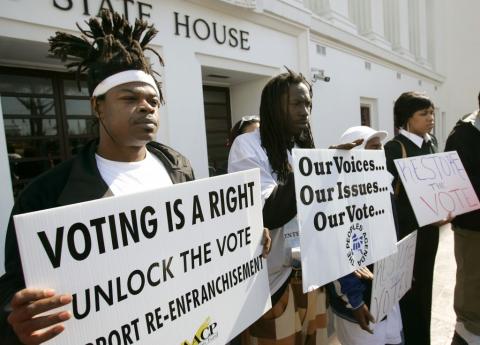Maryland’s legislature voted on Tuesday to override Gov. Larry Hogan (R)’s veto of a bill to give more than 40,000 ex-offenders in the state the right to vote while still on parole or probation.
Maryland joins 13 other states and the District of Columbia where citizens are permitted to vote immediately after serving their sentences. Hogan vetoed the legislation in May of last year after the legislature passed it with large majorities.
In response to the override, Hogan’s office issued a statement saying that he was disappointed with the decision and that “our citizens deserve better.”
“Today, twenty-nine people in the Maryland Senate decided to ignore reason and common sense and support an action that the vast majority of Marylanders vehemently oppose,” a spokesperson for the governor said. “For too long, voters have been completely ignored by their elected representatives in Annapolis.”
But there’s no evidence that a “vast majority” of Maryland voters opposed the bill, and national polls show that strong majorities of Amercians support restoring voting rights to non-violent offenders who have served their sentences. Emma Greenman, director of voting rights and democracy at the Center for Popular Democracy, told ThinkProgress that the legislature’s override is crucial for ensuring full political participation in Maryland.
“A lot of those voters are in Baltimore,” she said. “When we talk about political participation, it’s really important. This is a disenfranchised by law community. It’s so important to restore the rights for these 40,000 folks who are paying taxes, raising families, and want to have a political voice in the decisions that are affecting their lives.”
Ex-offenders and their allies unsuccessfully demonstrated in favor of the legislation in Baltimore last year to pressure the governor to sign the bill. Those in favor of the bill also wrote letters and phone banked to emphasize the importance of voting in helping people reintegrate into society after jail or prison.
The bill’s author, freshman Delegate Cory McCray (D-Baltimore), told ThinkProgress last May that it was crucial that people demonstrated to keep elected officials like Hogan accountable.
“When you can’t vote, you don’t have a seat at the table,” said McCray, whose Baltimore district has one of the highest ex-offender populations in the state. “Obviously, they’ve made mistakes, but these are our family members, our friends, our neighbors. These folks pay taxes. You can’t leave 40,000 people out of the conversation on subject matters that directly and indirectly impact them, like criminal justice reform, housing, access to fresh foods, employment, and transportation.”
Greenman, who was involved in the campaign to introduce the legislation, also said its passage will make it much easier to administer elections in the state because anyone not serving time in prison at the time of an election will be given the right to vote.
“It’s incredibly pragmatic for election administration,” she said. “It’s easy for folks on the ground, easy for folks coming out of prison to understand, and easy for election administration officials. Its a clear line.”
Greenman said she hopes the move creates momentum across the country to restore voting rights for ex-offenders. Currently, Minnesota lawmakers are considering a similar change. And more pressure is being put on Florida and the few states that permanently disenfranchise their former felons.


Spread the word